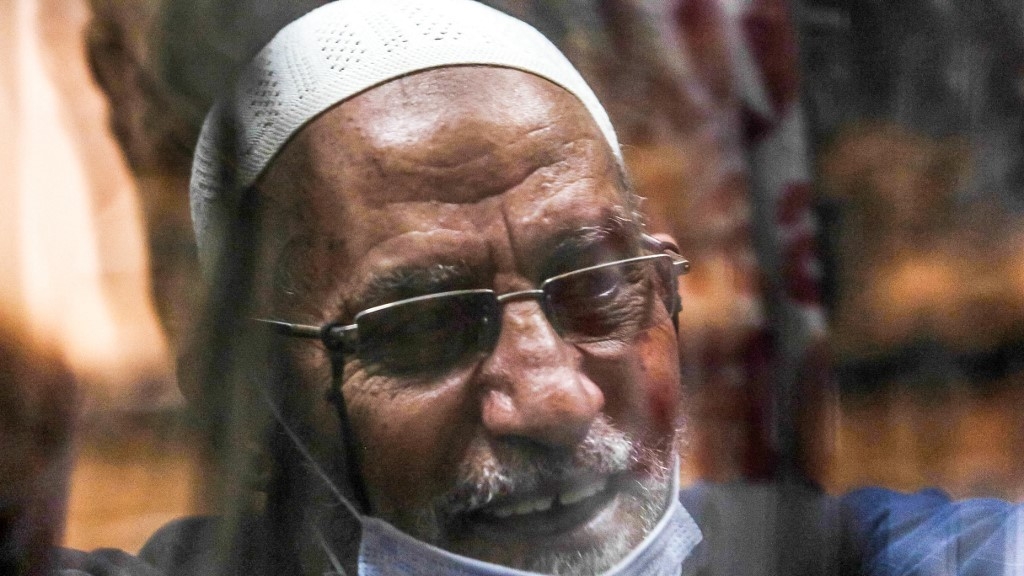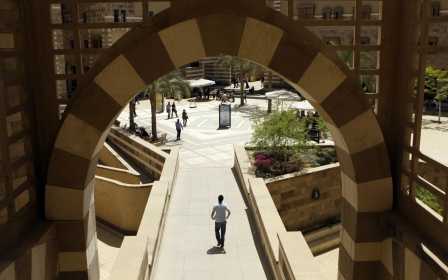Egypt: Brotherhood leader on hunger strike against conditions in new 'model prison'

Mohamed Badie, the detained leader of Egypt's largest opposition group, the Muslim Brotherhood, has begun a hunger strike inside his cell at a new prison in protest against mistreatment and medical negligence, a rights group said on Saturday, citing a leaked letter from prison.
Badie, 79, was transferred to Badr 3 prison last year from the notorious Tora Maximum Security Prison 992, known as Scorpion, where he had been held in solitary confinement for nine years.
He was among thousands detained in the summer of 2013, when then defence minister Abdel Fattah el-Sisi led a coup against his democratically elected predecessor Mohamed Morsi, a senior member of the Brotherhood.
According to the Egyptian Network for Human Rights, the Badr 3 prison, which holds some of the country’s most high-profile political prisoners and is touted as a model for other jails, has witnessed a mass hunger strike and several suicide attempts in recent weeks as a result of "tragic conditions", including bans on family visits and inadequate health care.
One inmate, Hossam Abu Shorouk, took his own life inside his cell this month, while another, Mohamed Turk Abu Yara, attempted to kill himself after prison officials refused to allow him to contact his family, who live in earthquake-affected areas in Turkey.
A third inmate, Awad Noaman, also attempted suicide and was transferred to the prison's hospital after wounding himself.
In a leaked letter sent to family members of detainees, the prisoners called on international rights groups and UN mechanisms to interfere to end their plight and hold Egyptian authorities accountable.
Badr prison 3, located 70 km to the northeast of Cairo, opened in December 2021 and has been promoted by the Egyptian government as a model of its prison reform agenda.
The prison is part of a complex labelled the Badr Correctional and Rehabilitation Centre. Many of its inmates are political prisoners transferred from the notorious Tora Prisons Complex in mid-2022, according to Amnesty International.
Several of them are held in arbitrary detention as their pre-trial detention has already expired, while others are held after "grossly unfair trials", the British rights group has said.
Middle East Eye could not independently verify the reports of suicide attempts and Badie's hunger strike at the time of writing. But the Committee for Justice, a Geneva-based rights organisation, said that it has documented at least five deaths of prisoners due to medical negligence in Badr 3 prison since its inauguration.
'Cruel and inhumane'
Meanwhile, Amnesty International has documented that prisoners in the Badr 3 prison are held in "cruel and inhumane conditions".
"Detainees shiver in cold cells with fluorescent lights switched on round the clock," Amnesty said in a report in October. "CCTV cameras are trained on them at all hours; and access to basic necessities such as sufficient food, clothing and books is banned.
"They are denied any contact with their families or lawyers and detention renewal hearings are held online."
Amnesty decried Egyptian efforts to paint the prison as turning a page on the country's poor prison culture.
While the prison was opened to “great fanfare by the authorities”, in reality, Amnesty said, “prisoners are facing the same human rights violations that have repeatedly blighted older institutions, exposing the lack of a political will from the Egyptian authorities to bring an end to the human rights crisis in the country.”
Egyptian jails hold an estimated 65,000 political prisoners, arrested for their opposition to the government of President Sisi, according to a study released by the Arabic Network for Human Rights in March 2021.
Hundreds of people have perished in prison since Sisi's coup due to medical negligence and lack of an urgent care system when a detainee suffers a medical emergency, including Morsi and former MP Essam el-Erian.
Middle East Eye propose une couverture et une analyse indépendantes et incomparables du Moyen-Orient, de l’Afrique du Nord et d’autres régions du monde. Pour en savoir plus sur la reprise de ce contenu et les frais qui s’appliquent, veuillez remplir ce formulaire [en anglais]. Pour en savoir plus sur MEE, cliquez ici [en anglais].





